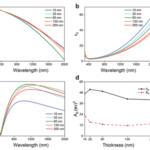2023-01-26 ピッツバーグ大学
◆ピッツバーグ大学スワンソン工学部の新しい研究によると、MOFはガスを吸い込むと著しく発熱し、熱くなりすぎると機能しなくなることがわかりました。
◆研究チームは、1万種類以上のMOFの熱伝導率を計算機上でスクリーニングし、100万時間以上のスーパーコンピューティングパワーを必要とした。その結果、密度が高く、孔が小さく、金属ノードが4つつながっているMOFは、熱伝導性が高いことがわかった。一方、孔が極端に大きいものは熱伝導性が低い。
◆ピッツバーグ大学、カリフォルニア大学バークレー校、カーネギーメロン大学、コロラド鉱山学校の研究者を含むウィルマー氏とその共著者達は、優れた熱特性を持つMOFの設計に焦点を当てています。ウィルマーは、コンピューターシミュレーションを使用してMOFの特性を予測する以前の研究で、広く引用されています。
◆彼らの論文は、最近、npj Computational Materialsに掲載されました。(DOI: 10.1038/s41524-022-00961-x)
<関連情報>
- https://news.engineering.pitt.edu/too-hot-to-handle/
- https://www.nature.com/articles/s41524-022-00961-x
仮想的な有機金属骨格を用いた熱伝導のハイスループット・スクリーニング High-throughput screening of hypothetical metal-organic frameworks for thermal conductivity
Meiirbek Islamov,Hasan Babaei,Ryther Anderson,Kutay B. Sezginel,Jeffrey R. Long,Alan J. H. McGaughey,Diego A. Gomez-Gualdron & Christopher E. Wilmer
npj Computational Materials Published:20 January 2023
DOI:https://doi.org/10.1038/s41524-022-00961-x

Abstract
Thermal energy management in metal-organic frameworks (MOFs) is an important, yet often neglected, challenge for many adsorption-based applications such as gas storage and separations. Despite its importance, there is insufficient understanding of the structure-property relationships governing thermal transport in MOFs. To provide a data-driven perspective into these relationships, here we perform large-scale computational screening of thermal conductivity k in MOFs, leveraging classical molecular dynamics simulations and 10,194 hypothetical MOFs created using the ToBaCCo 3.0 code. We found that high thermal conductivity in MOFs is favored by high densities (> 1.0 g cm−3), small pores (< 10 Å), and four-connected metal nodes. We also found that 36 MOFs exhibit ultra-low thermal conductivity (< 0.02 W m−1 K−1), which is primarily due to having extremely large pores (~65 Å). Furthermore, we discovered six hypothetical MOFs with very high thermal conductivity (> 10 W m−1 K−1), the structures of which we describe in additional detail.



